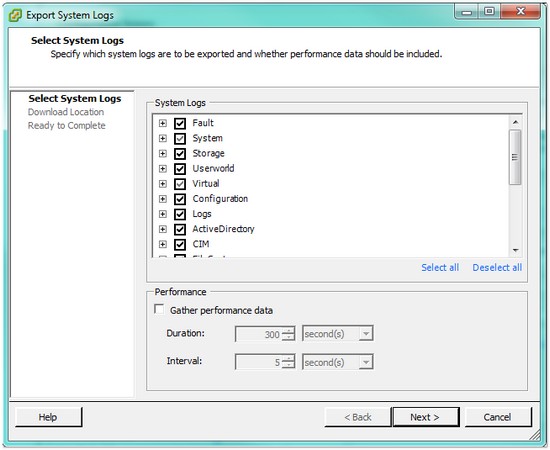When raising incidents with VMware technical support it is likely that you will need to generate log bundles to aid the investigation.
Generating Log Bundles for ESXi and vCenter
Using the vSphere client, either connected to vCenter or directly to an ESXi host you can Export System Logs, from the option on the File menu:
You can then choose what diagnostic data you wish to export:
The next screen will allow you to choose a download location, then the logs will be gathered and downloaded.
PowerCLI
You can also generate log bundles using PowerCLI by running the following command once you are connected to either vCenter or a host:
Get-Log -Bundle -DestinationPath <path>
Once its complete you will have the logs collected into a single .tgz file:
vm-support
Another way of generating host log bundles is by running the vm-support script. You can do this via a SSH or console connection to a host, by running vm-support:
There are various options/switches you can specify when running vm-support, as shown below:
/var/log/vmware # vm-support -h
Usage: vm-support [options]
Options:
-h, --help show this help message and exit
-g GROUPS, --groups=GROUPS
Gather data from listed groups
-a MANIFESTS, --manifests=MANIFESTS
Gather from listed manifests
-e EXCLUDEMANIFESTS, --excludemanifests=EXCLUDEMANIFESTS
Exclude the listed manifests
--listmanifests List available manifests
-G, --listgroups List available manifest groups
-t, --listtags List available manifest tags
-p, --performance Gather performance data
-d DURATION, --duration=DURATION
Duration of performance monitoring (in seconds)
-i INTERVAL, --interval=INTERVAL
Interval between performance snapshots
-v VM, --vm=VM Gather detailed information about this specific VM (ie
--vm )
-V, --listvms List currently registered VMs
-w WORKINGDIR, --workingdir=WORKINGDIR
Directory to create .tgz in
-D, --dryrun Prints out the data that would have been gathered
-s, --stream stream data to stdout
-q, --quiet Output only the location of the bundle
-E ERRORFILE, --errorfile=ERRORFILE
Prints (non-fatal) errors to specified file (overrides
--quiet and --stream)
--loglevel=LOGLEVEL Set logging to specified level: 0-50 (0=most verbose)
--version Display the vm-support version
-l, --listfiles List all files gathered by vm-support
As an alternative to running this directly from a CLI prompt, you can stream the log bundle to a management server or VMA by running:
ssh root@ESXHostnameOrIPAddress vm-support -s > vm-support-Hostname.tgz
vi-admin@localhost:~> ssh root@192.168.0.235 vm-support -s > vm-support-Hostname.tgz The authenticity of host '192.168.0.235 (192.168.0.235)' can't be established. RSA key fingerprint is 65:fd:99:82:d6:52:43:d7:37:d9:4f:40:8f:f2:bc:49. Are you sure you want to continue connecting (yes/no)? yes Warning: Permanently added '192.168.0.235' (RSA) to the list of known hosts. Password:
Or you can use a web browser to generate and download the log bundle:
https://root:password@10.11.12.13/cgi-bin/vm-support.cgi
Or
wget https://root:password@10.11.12.13/cgi-bin/vm-support.cgi
bash$ wget https://root:Pa55w0rd@192.168.0.235/cgi-bin/vm-support.cgi
--14:46:12-- https://root:*password*@192.168.0.235/cgi-bin/vm-support.cgi
=> `vm-support.cgi'
Connecting to 192.168.0.235:443... connected.
HTTP request sent, awaiting response... 200 OK
Length: unspecified [binary/octet-stream]
[ <=> ] 29,367,761 375.57K/s
14:47:28 (375.57 KB/s) - `vm-support.cgi' saved [29367761]
bash$
Useful Links and Resources
https://www.vmware.com/files/pdf/techpaper/VMware-Customizing-vm-support-vSphere50.pdf



